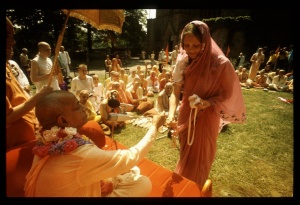SB 10.57.34: Difference between revisions
(Vanibot #0018 edit: make synonym terms in Sanskrit italic in SB - Vanisource) |
(Vanibot #0054 edit - transform synonyms into clickable links, which search similar occurrences) |
||
| Line 23: | Line 23: | ||
<div class="synonyms"> | <div class="synonyms"> | ||
''iti'' | ''[//vanipedia.org/wiki/Special:VaniSearch?s=iti&tab=syno_o&ds=1 iti]'' — thus; ''[//vanipedia.org/wiki/Special:VaniSearch?s=vṛddha&tab=syno_o&ds=1 vṛddha]'' — of the elders; ''[//vanipedia.org/wiki/Special:VaniSearch?s=vacaḥ&tab=syno_o&ds=1 vacaḥ]'' — the words; ''[//vanipedia.org/wiki/Special:VaniSearch?s=śrutvā&tab=syno_o&ds=1 śrutvā]'' — having heard; ''[//vanipedia.org/wiki/Special:VaniSearch?s=na&tab=syno_o&ds=1 na]'' — not; ''[//vanipedia.org/wiki/Special:VaniSearch?s=etāvat&tab=syno_o&ds=1 etāvat]'' — only this; ''[//vanipedia.org/wiki/Special:VaniSearch?s=iha&tab=syno_o&ds=1 iha]'' — of the matter at hand; ''[//vanipedia.org/wiki/Special:VaniSearch?s=kāraṇam&tab=syno_o&ds=1 kāraṇam]'' — the cause; ''[//vanipedia.org/wiki/Special:VaniSearch?s=iti&tab=syno_o&ds=1 iti]'' — thus; ''[//vanipedia.org/wiki/Special:VaniSearch?s=matvā&tab=syno_o&ds=1 matvā]'' — thinking; ''[//vanipedia.org/wiki/Special:VaniSearch?s=samānāyya&tab=syno_o&ds=1 samānāyya]'' — having him brought back; ''[//vanipedia.org/wiki/Special:VaniSearch?s=prāha&tab=syno_o&ds=1 prāha]'' — said; ''[//vanipedia.org/wiki/Special:VaniSearch?s=akrūram&tab=syno_o&ds=1 akrūram]'' — to Akrūra; ''[//vanipedia.org/wiki/Special:VaniSearch?s=janārdanaḥ&tab=syno_o&ds=1 janārdanaḥ]'' — Lord Kṛṣṇa. | ||
</div> | </div> | ||
Latest revision as of 19:30, 17 February 2024

A.C. Bhaktivedanta Swami Prabhupada
Please note: The synonyms, translation and purport of this verse were composed by disciples of Śrīla Prabhupāda
TEXT 34
- iti vṛddha-vacaḥ śrutvā
- naitāvad iha kāraṇam
- iti matvā samānāyya
- prāhākrūraṁ janārdanaḥ
SYNONYMS
iti — thus; vṛddha — of the elders; vacaḥ — the words; śrutvā — having heard; na — not; etāvat — only this; iha — of the matter at hand; kāraṇam — the cause; iti — thus; matvā — thinking; samānāyya — having him brought back; prāha — said; akrūram — to Akrūra; janārdanaḥ — Lord Kṛṣṇa.
Translation and purport composed by disciples of Śrīla Prabhupāda
TRANSLATION
Hearing these words from the elders, Lord Janārdana, though aware that the absence of Akrūra was not the only cause of the evil omens, had him summoned back to Dvārakā and spoke to him.
PURPORT
Since Lord Kṛṣṇa is the supreme controller, it was obviously by His will that certain troubles appeared in the city of Dvārakā. Superficially these evils may have been caused by Akrūra's absence, and also by the absence of the auspicious Syamantaka jewel. But we should recall that Dvārakā is the eternal abode of Lord Kṛṣṇa; it is a city of divine bliss because the Lord resides there. Still, to execute His pastimes as a prince of this world, Lord Kṛṣṇa did the needful and summoned Akrūra.